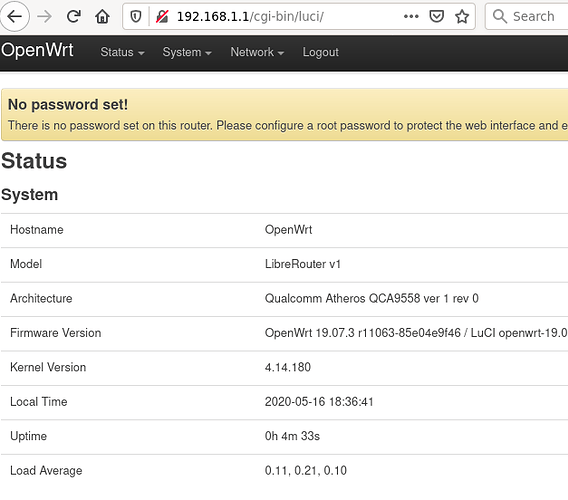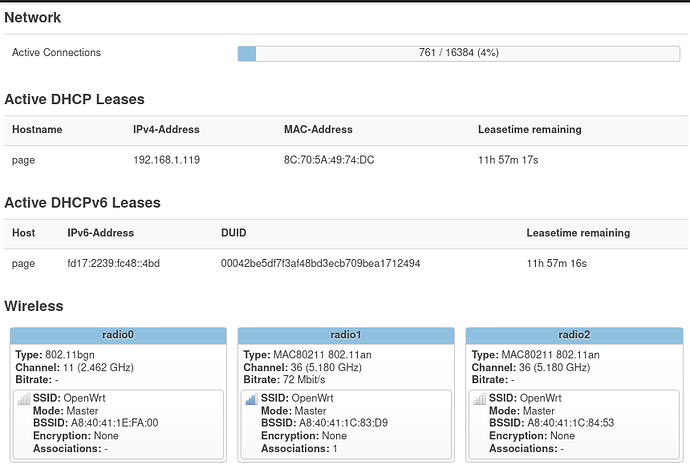I have updated a bit the information and added a warning about using safe-upgrade to install firmwares that don’t have dual boot support (any that is not LibreRouterOs). I would always recommend using LibreRouterOs for mesh use.
For other uses I would say that may be better to use OpenWrt directly.
I have added a section to the wiki post: “How to Change from LibreRouterOS to OpenWrt”. It is based on OpenWrt documentation. Maybe you can check if it looks correct.
How important is wifi-unstuck-wa? In other words, is it dangerous to install the firmware from the OpenWrt website because it does not have the wifi-unstuck-wa package?
Are there dangers of the partition table getting corrupted by switching to OpenWrt? Or by switching from OpenWrt back to LibreRouterOS? I don’t know much about the partitions… will OpenWrt only use half of the available storage space, because the other half is saved for a safe-boot system?
It is not dangerous. The radios will work good enough for multiple purposes, and like the other routers that use ath9k (multiple tp-link devices, etc). This is a workarround with the objetive of providing 24x7 stability. In a mesh network it is recommended to use it (or some cronjob that does the same). For other use cases it may be not very important. The router will run fine most of the time and scenarios. It prevents some edge cases (not identified and not able to reproduce) the arise in the wild from time to time. The router will only need a reboot (or a manual wifi scan) if this happens.
The upgrade instructions depend on which partition you are (1 or 2). To know it you must run safe-upgrade show and check the current partition value.
If current partition is :
From partition 1
This will install OpenWrt to partition 1 from partiton 1.
Use sysupgrade: sysupgrade -n /tmp/xxxx-librerouter-v1-squashfs-sysupgrade.bin. It may be posible that an error of invalid image is displayed. If you are very sure that you have a liberouter imagen then you can add --force to the sysupgrade command.
From partition 2
This will install OpenWrt to partition 1 from partiton 2.
Use safe-upgrade: safe-upgrade upgrade -n /tmp/openwrt-xxxx-librerouter-v1-squashfs-sysupgrade.bin. Then reboot. After the reboot if the image is working fine you have to confirm it. As safe-upgrade may not be available in this image you can confirm it using fw_setenv stable_part 1
@patogit can you update the instructions please?
The OpenWrt images only use half the space (like LibreRouterOs), so partition 2 won’t be overwritten if you use the guide above.
I’ve also tested that 19.07.3 image works good:
Thank you for the details, @SAn 
How do we do this?
yes
EDIT: I have updated the instructions. Please read them to check for errors.
In NuestraRed for some equipments we are using OpenWRT version 19 with the LibreMESH packages, normally what we do for the Firmware is compile it based on the official OpenWRT branch and add the packages we need from LibreMESH and custom configurations for the network, in the documentation.
Soon I will publish in this link the things that must be taken into account to have the LibreMESH packages working in OpenWRT version 19 to create a mesh network. https://docutopia.tupale.co/Compilando-LibreMESH
Ah sorry, the words that I used are not the best! I will update directly the instructions (the confirm I am referring is to “confirm the image” not to “confirm that the safe-upgrade is not avaialable in this image” 
How to change from OpenWrt to LibreRouterOs
I have just added this ^ section, but I do not have an easy way to test the instructions right now.
@SAn, can you review it?
Thanks! Reviewed and added minor improvements and some warnings.
TL;DR: You can build your own firmware …
@SAn @gferrero Are these instructions still valid for LROS 1.4.2?
Hi Pato! They should be still valid, but I did not test it.
I have just tried to change from LROS v1.4.2 to OpenWRT 21.02.0, and it did not work. In LROS via SSH, I saw that LROS was using partition 2, so I followed the instructions, and used the --force flag. Once the device rebooted, it couldn’t maintain a wired Ethernet connection for more than 2 or 3 seconds, it keep resetting the connection, so I could not login via SSH nor via LuCI, and eventually the safe-upgrade function returned the device to LROS v1.4.2.
Any help would be much appreciated. I want to connect to a non-OpenWRT wifi signal with a 5 GHz radio, as my WAN connection, and I only know how to do this with OpenWRT, not with LROS.
LibreMesh does not support OpenWrt 21.02 yet…maybe you are the first trying!
Check the following articles on how to connect a libremesh node as a client to a wifi access point:
I’m trying to install vanilla OpenWRT downloaded from the OpenWRT LibreRouter page. I am not trying to install LibreMesh. I will check out the link you mention. Thanks!
Ahhhh sorry I misunderstood you. Well… I will test 21.02 myself in a few days!
ok, I’ll try 19.07.8 vanilla OpenWRT firmware for LR, from the OpenWRT firmware selector.
Hi Pato, I was able to install 21.02.1 in the LibreRouter without issues and it provides DHCP in the LAN port. I used the safe-upgrade upgade -n firmware.bin instructions from partition 2.
Today I had a LibreRouter with (probably) LibreRouterOS 1.4, and I used the instructions above, with new URL for the most recent stable version of OpenWrt (21.02.3). The only thing I had to change was:
- access via SSH using the command (gracias @nicopace sugerencia )
ssh -o "HostkeyAlgorithms=+ssh-rsa" -o "PubkeyAcceptedAlgorithms=+ssh-rsa" root@thisnode.info
- run this set of commands when I first logged in to the LR via SSH:
opkg update
opkg install libustream-mbedtls ca-bundle ca-certificates
The updated URLs are:
DOWNLOAD_LINK="https://downloads.openwrt.org/releases/21.02.3/targets/ath79/generic/openwrt-21.02.3-ath79-generic-librerouter_librerouter-v1-squashfs-sysupgrade.bin"; SHA256SUMS="https://downloads.openwrt.org/releases/21.02.3/targets/ath79/generic/sha256sums"
After the LR rebooted in OpenWrt, and I connected to it via the browser GUI Luci, it didn’t ask me for confirmation. Just in case it was necessary, I set a root password (I think this is necessary to enable SSH access?) and then logged in via SSH and ran fw_setenv stable_part 1. I don’t know if it mattered, but I did it just in case.
A little while later (I don’t remember if it was one minute or ten minutes), the router seemed to spontaneously reboot. After that it remained stable.
How to change from OpenWrt to LibreRouterOs
I had a LR with OpenWrt 21.02.3, and I just changed to LROS v1.5 using the LuCI interface. I had no problems.
For testing, I used LimeApp to change from LROS to OpenWrt 22.03rc6, and it seems to have bricked the LR. The LR boots. It does not generate a WiFi AP. When I connect via cable to the LAN port, the LR assigns an IPv6 IP to my laptop. When I set my laptop to only use IPv4, the LR does not assign an IPv4 via DHCP. The IPv6 gateway and DNS is fe80::aa40:41ff:fe1d:294f . Can you tell if this is OpenWrt, LROS, or something else?
After pressing the reset button for about 30 seconds, I waited for the LR to reset, and the behavior remained the same. I disconnected the power, so the LR turned off. I reconnected the power, the LR turned back on, and now LROS is functioning with all the settings it had.
Summary: Going from LROS to OpenWrt via LuCI did not work for me.


